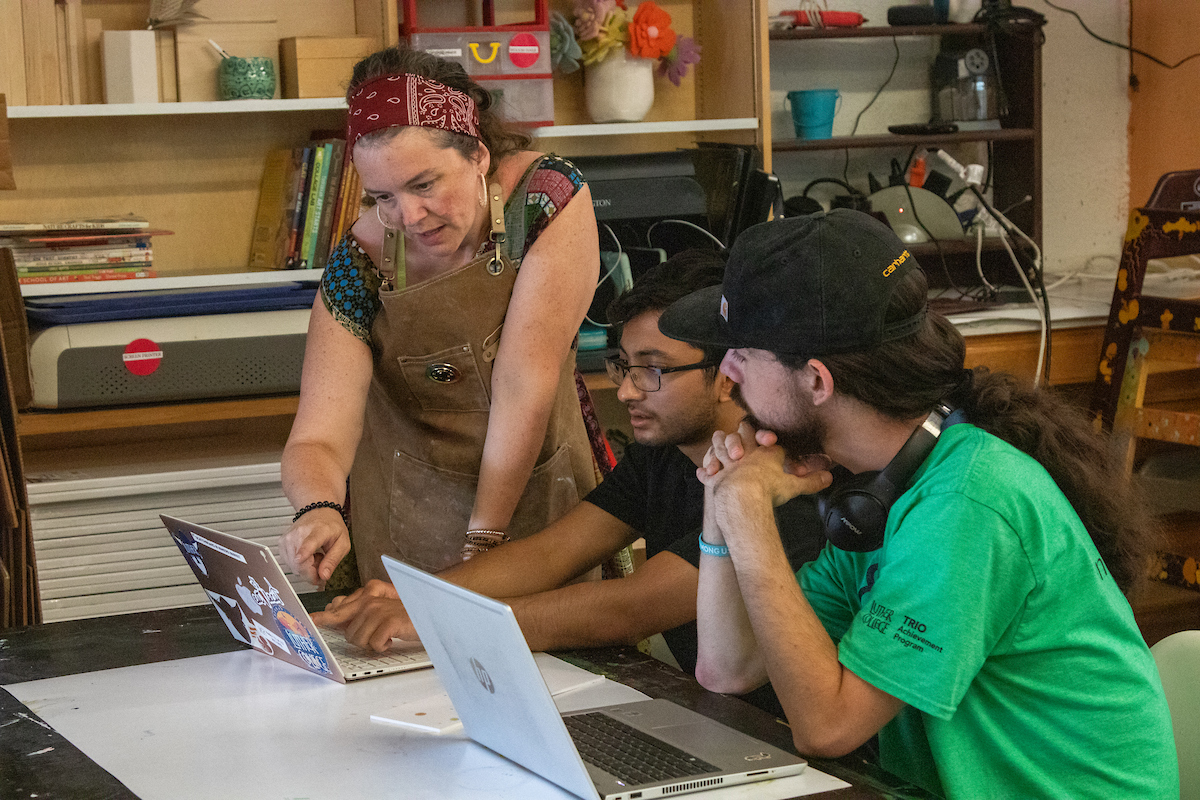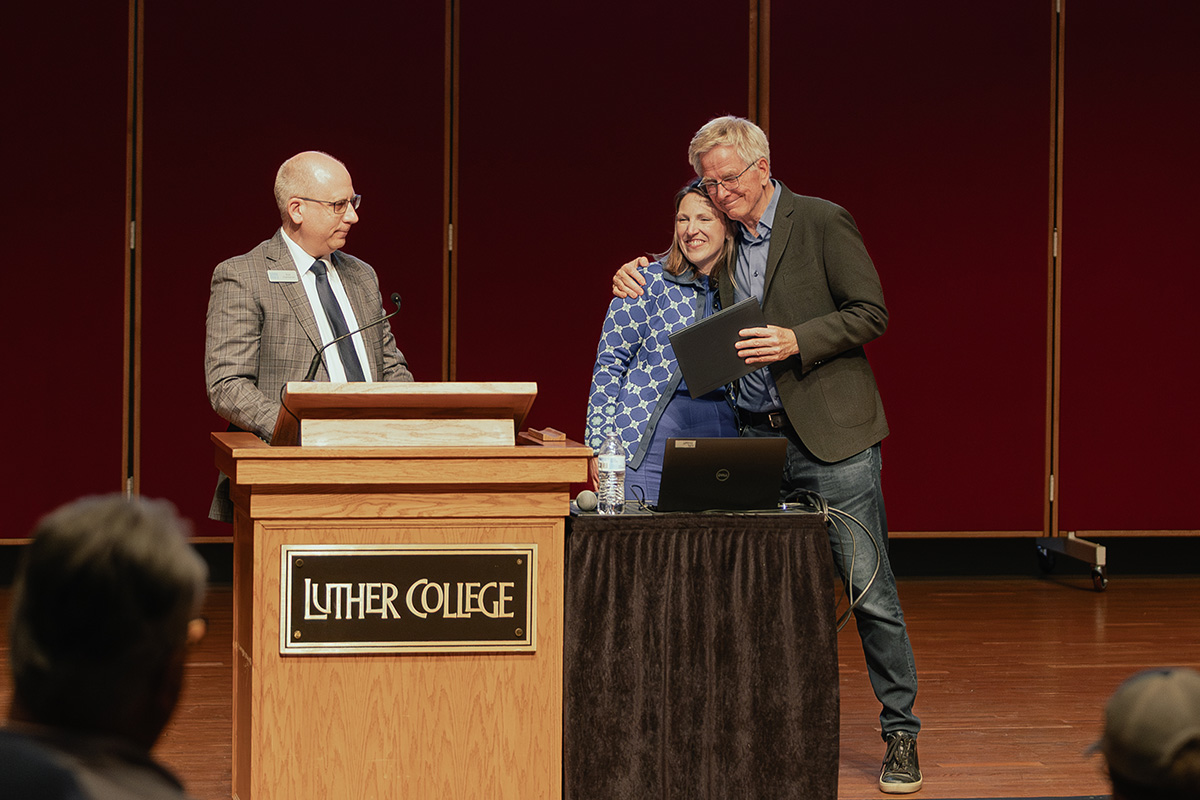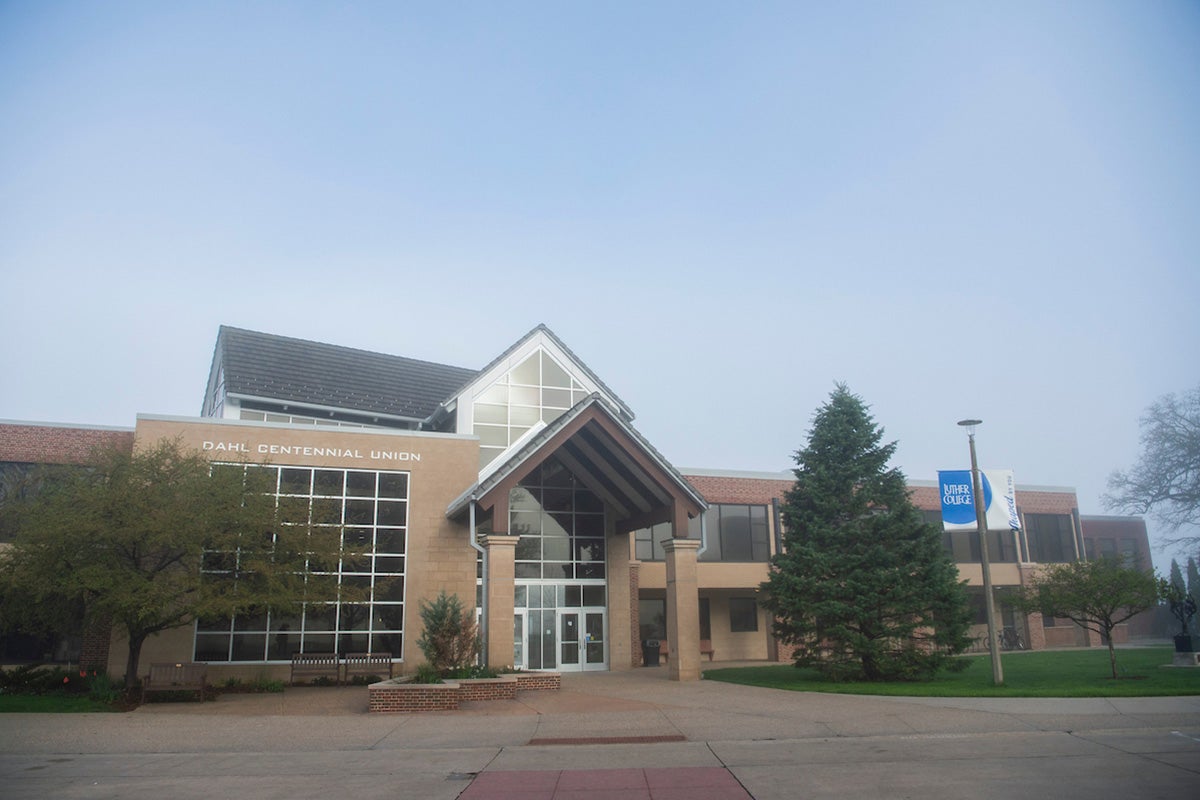Luther College announces new core curriculum with an emphasis on skills-based and experiential learning

Arthaus Director Shannon Dallenbach Durbin (left) works with Luther students Soren Basnet (center) and Grayson Gardner (right) to develop a software to check into the art center through the Social Impact Research Fellowship, an example of experiential learning.
DECORAH, IOWA—Luther College has launched an updated core curriculum beginning for first-year students in the fall 2023 semester that includes skill-building courses across a variety of disciplines and a greater emphasis on experiential learning within the community.
The curriculum includes fewer required credits and gives students more flexibility to pursue their interests and passions within their Luther education. It also fulfills the college’s goals to provide a more skills-based curriculum.
“Revising the general education curriculum is a daunting task, and I am grateful to the faculty for their good, intentional, and thoughtful work to adjust the curriculum. The new curriculum is both grounded and global – grounded in the liberal arts, in the Lutheran intellectual tradition, and in Luther’s location in the Driftless region; and global in its perspective and impact,” said Luther College Provost Brad Chamberlain. “I am especially excited about the focus of the new curriculum on high-impact learning practices, its emphasis on experiential and community-based learning, and its commitments to global engagement, social and environmental justice, and wellness.”
As part of the new curriculum, students will take six literacy courses, one of each in creative, data, religious, scientific, social systems and textual literacies. These courses are designed to cultivate critical thinking and close-reading skills. The courses are also designed so that students can take these classes across a variety of disciplines and are not limited by department or division. For example, a January Term class that could satisfy the data literacy requirement is Math and Democracy, which will explore how numbers impact democratic practices like mapping political districts.
“Students won’t remember all the content in a course, so we’re focused on learning outcomes, and providing students with the critical thinking and literacy skills that will prepare them for their futures,” said Jill Leet-Otley, a professor of education who led implementation efforts of the new curriculum as chair of the faculty Curriculum Committee.
Luther’s longtime signature Paideia program will remain part of the updated curriculum, with first-year students taking Paideia 111 and 112: Enduring Questions, and seniors continuing on to the capstone course Paideia 450: Ethical Choices.
The new core curriculum also emphasizes high-impact learning practices, designed to shrink equity gaps and provide higher-level cognitive learning for students. High-impact practices include experiential and community-based learning. The experiential learning component of the curriculum will make research and internships accessible to all students.
Community-based learning opportunities will be embedded in Paideia 450 courses. This new approach is a distinctive component of the new core curriculum. “In Paideia 450, students will engage in community locally, regionally and globally as they discuss ethical challenges of the 21st-century world,” said Kate Elliott, associate professor of art history and dean of student success.
“For example, students may work in local food banks as they think about sustainable food systems. Other courses may partner with local sustainable energy non-profits, conducting energy audits on campus properties,” Elliott said.
The new curriculum will run concurrently with the previous curriculum, so that sophomores, juniors and seniors can continue their education under the curriculum that they began with. The two curricula will overlap for the next three years, and many classes will be cross-listed for all students at Luther.
Luther College last updated the core curriculum in 2005 and decided to revise its curriculum as part of the 2018-2023 strategic plan. There were a substantial amount of conversations, which included the input of the current faculty and students, to ensure that the new criteria met the standards of liberal arts education and would prepare students for the workforce or graduate school. The faculty voted in April 2022 to approve the new curriculum.
“We wanted a curriculum that the current faculty all feel like they have shared ownership over,” said Elliott, who supported the coordination and implementation of the new curriculum in her former role as associate dean and director of the Center for Excellence in Learning and Teaching.
Student input was also considered vital to forming the new core curriculum. Salomé Valdivieso Santillán, a 2023 Luther graduate, served as the Student Senate representative on the curriculum committee in 2022. She felt that the committee listened to student feedback about revamping Luther’s general education program.
“I wanted to see a curriculum that allows me to explore my passions as a scholar, but at the same time that prepares me to be an empathetic and conscientious professional later in life,” Valdivieso Santillán said. “The beauty of the academic community here at Luther is that you don’t only learn about a specific subject, you have the freedom to choose and explore with the liberal arts model, while also learning about core values that will help you navigate big questions throughout your life.”
As a result of student demand, social and environmental justice have also been integrated into the new curriculum. Students will be able to explore these concepts through courses such as art, music or biology.
“We want students to find passions of their own, instead of just taking a class that checks a box,” Leet-Otley said.
About Luther College
At Luther College in beautiful Decorah, Iowa, students explore big questions and take action to benefit people, communities and society. Our academic programs, experiential approach to learning and welcoming community inspire students to learn actively, live purposefully and lead courageously for a lifetime of impact. Learn more at luther.edu.
Related Posts

The Doctor of Humane Letters honoris causa recognizes Steves’ promotion of the value of travel as an educational tool for last 40 years.

The events are open to the general public on Sunday, April 27.
Contact Information
Michelle Volkmann
Media Relations Specialist
Phone: 563-387-1417